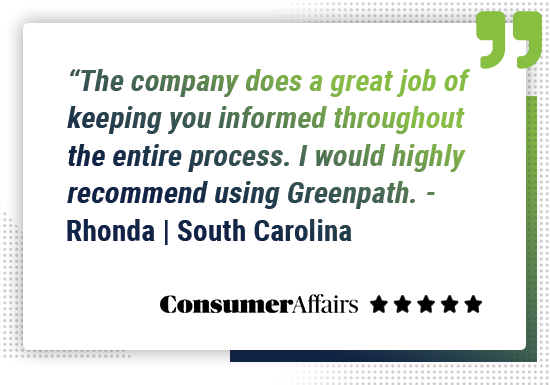Homeownership Starts with a Plan
- June 13, 2022
Buying a home is one of the most exciting and important decisions of your life. While this is a challenging market, there is a way to get ready for that new home, sweet home.
Staring with a plan can be helpful, especially in a tough market. Knowing what you want and what you can afford, and understanding the mortgage process are all big pieces of the puzzle.
You’ll need to know your credit health and monthly budget. This will determine what you can afford.
GreenPath is A Trusted National Nonprofit of 60 Years
Before you go to an open house and get your heart set on your dream house, it’s a good idea to prepare. Talk to a housing counselor.
GreenPath is A Trusted National Nonprofit of 60 Years
Take advantage of a free counseling session. Confidential and pressure-free. Talk to a financial counselor today.

Credit Health
Your first step is to obtain your free credit report. Check it for errors. Your estimated FICO credit score should be least 675, or better yet, over 700. If you have a lower score, your interest rate may be higher and it may be difficult to get an approval. If your score is low, we suggest that you work on improving your credit score before applying for a mortgage. Otherwise, your mortgage payment will be much higher.
Monthly Budget
The next step is to create a budget of your monthly income and expenses. Before you apply for a mortgage, you’ll need to gather pay stubs, bank statements and past years’ tax returns. Lenders will also ask to see your monthly expenses. This includes your outstanding debts. Large recurring monthly expenses (like an auto loan) may affect your chances of getting approved for a mortgage. Avoid taking on a new loan prior to applying for a mortgage.
How Much Can You Afford?
Before you speak to the lender, figure out how much you can afford. A good guideline is that your total payment should be less than a third of your income. For example, if you and a co-buyer have a combined salary of $75,000 a year, you shouldn’t spend more than $25,000 a year (a little over $2,000 per month) on your home. Just make sure that you don’t let your excitement (or the suggestions of a real estate agent) convince you to buy a home you can’t afford.
Selecting a Mortgage Company
Now that you know how much you can afford, you need to decide where to shop for a mortgage loan.
Reach Out to A Counselor. 100% Free Debt Counseling. Confidential & Pressure Free.
GreenPath provided a total of 86,532 financial services 2021.
Research Rates
Start by looking up rates online. On Bankrate.com, you can find the current average national mortgage rates. It also gives you online lenders to research. Research local banks and credit unions by calling or visiting their websites. You may want to ask friends, family or a real estate agent to recommend a lender.
Meet With the Lender
After you identify a lender you like, meet with the lender to get a feel for the person you’ll be working with. They must be informed and honest. This is the person who will guide you toward the right loan. They need to keep your budget and best interest in mind.
Choosing a Mortgage
Not every home loan will be right for you. There are home loans for every type of borrower. Interest rates can be fixed or adjust over time. Down payments can vary from 0 to 20 percent. Some loans only need payment on the interest of the loan. Other loans can have a large balloon payment after a period of time. There are more loan choices than ever, which is why you must be careful to select a loan that works for you.
Buyer beware
Remember the phrase “buyer beware.” It’s your duty to understand the loan terms. They can be very complex. Do not be afraid to ask questions about things you don’t understand. Consider talking to a non-profit housing counselor. They can help you to understand your loan options. Your lender has a financial interest in selling you a loan. A housing counselor is neutral and can give unbiased advice.
Start A Conversation with A Financial Expert Today
Watch Out for Payment Increases
Avoid a mortgage that may cause problems with your budget in the future. For example, let’s say you are thinking about a 3-year adjustable rate mortgage that offers a cheap payment. It may be tempting. But you need to consider what your payment will be in three years. After 36 months, your rate will adjust and your payment could go up 25-30%. Will you be able to afford an increase like that? It’s always wise to consider a 30-year fixed mortgage. You are locking in an interest rate for 30 years. This gives you the comfort of a fixed principal and interest payment.
Calculate Your Monthly Payment
Understand that your monthly payment will be higher than the cost of your principal and interest payments. Additional variables such as property taxes, the cost of home insurance, private mortgage insurance (PMI), and any condo or association fees will increase the amount of your monthly payment. Again, a good guideline is that your total housing payment (including taxes andinsurance) should be one third of your income or less.
Determine the Size of Your Downpayment
How much can you afford to put down in a lump sum? In today’s market, it is standard for the mortgage lender to require at least a 20-percent down payment for a conventional loan. VHA loans require a much smaller down payment (generally 3.5%), but the interest rate will likely be higher.
Buying a house is a big financial commitment. If you’re patient and disciplined about following the steps above, you’ll be well on your way to making a smart home-buying decision.
